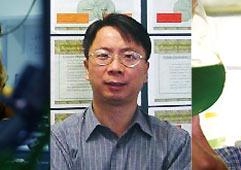Federation Fellowships trifecta for UNSW
Three UNSW academics have been named 2008 Australian Research Council Federation Fellows by Prime Minister Kevin Rudd and the Minister for Innovation, Industry, Science and Research, Senator Kim Carr.
Three UNSW academics have been named 2008 Australian Research Council Federation Fellows by Prime Minister Kevin Rudd and the Minister for Innovation, Industry, Science and Research, Senator Kim Carr.

Three UNSW academics have been named 2008 Australian Research Council Federation Fellows by Prime Minister Kevin Rudd and the Minister for Innovation, Industry, Science and Research, Senator Kim Carr.
The naming of Professors Brett Neilan, Michelle Simmons and Aibing Yu has seen UNSW receive more Federation Fellowships than any other Australian research institution. The trio are among 14 outstanding academics, selected from a highly competitive field of candidates, who will share $23m over the next five years to advance Australian research and innovation. The ARC Federation Fellowships scheme supports excellence in research by attracting world-class research leaders to key positions in Australia.
Deputy Vice-Chancellor (Research) Professor Les Field FAA, offered his congratulations to UNSW's three new Federation Fellows: "Professor Brett Neilan is an outstanding molecular biologist and a world expert in the study of toxic cyanobacteria, which is increasing in frequency, global distribution and human intoxication. Toxic cyanobacteria form harmful blue-green algal blooms in rivers and reservoirs.
"Under this Fellowship, Professor Neilan plans to fully characterise the genetic and biochemical basis of toxin biosynthesis and its regulation in cyanobacteria. This research will provide new understanding of both the factors that affect drinking water quality and the future of novel pharmaceuticals, including antibiotics, anaesthetics and immunosuppressants."
Professor Michelle Simmons, receiving her second Federation Fellowship, is Director and Program Manager of the Atomic Fabrication Facility at UNSW and ARC Centre of Excellence for Quantum Computer Technology. With the enormous economic pressure to produce ever smaller and faster transistors, the semiconductor industry is committed to pushing silicon technology to its limits.
"Under her first Federation Fellowship, Professor Simmons has already demonstrated a radical new fabrication strategy of commercially-based silicon transistors at the atomic scale," Professor Field said. "Creating an international hub for atomic-scale electronics in Australia, she now plans to address fundamental impediments to transistor scaling, which are of vital strategic importance for the global semiconductor industry."
Professor Aibing Yu, UNSW Scientia Professor and Director of the Centre for Simulation and Modelling of Particulate Systems, is a world-leading scientist in powder and process engineering with expertise in the simulation and modelling of particulate systems.
"Professor Yu's research program aims to overcome problems in the design capacity of particulate and multiphase processes used widely in Australian industries that provide significant export income, such as minerals, metallurgical, chemical, energy, pharmaceuticals and materials," Professor Les Field said. "Using an extensive combined fundamental and applied approach, he plans to improve process design, control and optimisation to enhance Australia's productivity and competitiveness in these industries."
In the 2008 funding round, two Federation Fellowships were awarded to researchers at Monash University and the Australian National University, and one each will go to the CSIRO's Australia Telescope National Facility, Curtin University of Technology, Flinders University, James Cook University, the University of Adelaide, the University of Queensland, and the University of Sydney.
Media enquiries, Dan Gaffney, 0411 156 015